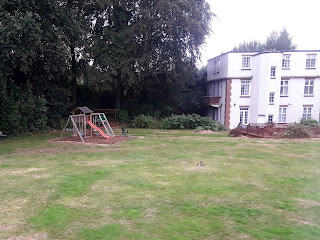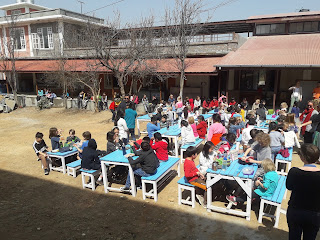Last Thursday I (Dan) was in a lot of pain in my stomach and
quite unwell. When I woke on Friday and the pain was still there and had moved
into the lower abdomen I feared what this meant. A call to the NHS 111 helpline
confirmed that I needed to see a doctor, who then diagnosed suspected appendicitis.
 |
| Waiting for surgery |
Becky and I headed up to the John Radcliffe hospital in Oxford,
locally known by all as the JR. Having been referred to the Emergency Surgical Unit
we were well aware of what might be ahead, and indeed the diagnosis was
confirmed and I was told to prepare for surgery. We did have to wait a few
hours, but less than 12 hours after seeing a doctor for the first time I was
being wheeled down the corridors towards the operating theatre.
First up I got to meet the anaesthesiologists. These were a
very friendly bunch who greeted you and joked with you like you were about to
become life long friends. They then knock you out and you never see them again.
I awoke a few hours later and was soon dispatched to the ward, the pain, along
with regular checks through the night by the automatic machine which suddenly
takes your blood pressure without warning (imagine your partner suddenly
grabbing hold of your arm very tightly at random intervals through the night!)
and the nurse who kept checking my temperature and scanning my barcode meant
that sleep was fitful.
In the morning it was clear I’d had surgery from my nice
scars and the pain! As the consultant said though, “Is the pain different?
Cause if it’s the same pain then our surgery obviously hasn’t worked, at least
if the pain is different we know we’ve done something.” I was pleased to report
the pain was different. A few hours later I was discharged and now it’s the slow
recovery. Okay, a few weeks isn’t that long compared to those who have major
surgery, but not lifting anything more than a kettle for 2 weeks will definitely
be frustrating at times!
An appendectomy is apparently the most commonly performed
surgery worldwide and while all surgery carries some risk, it’s appears to be (from
my extensive knowledge or internet research) one of the more straightforward
and least risky surgeries. I’m sure many of you reading have had this or had
someone you know go through this.
 |
| Hospital souvenirs |
A number of people have asked “Are you glad this happened
now or a few weeks back in Nepal.” Honestly this question has got me thinking.
I know that the medical care in Nepal would have been fine, I’ve had friends go
through this surgery there, and they do the keyhole too, and they do a good
job. The doctors I would have seen would have probably spoken fluent English,
as most well-educated people in Kathmandu can. In Nepal Becky would have been
able to stay with me all the way through (except the actual surgery), whereas
here she got sent home an hour or so before I went for surgery as visiting
times were over. Of course, in Nepal she, or someone, would have been required
to stay with me as healthcare doesn’t include any extra care. She’d have had to
get my medicines and meals. In the UK they do explain things in much more
detail which is reassuring that you really do know what’s going on. And then of
course there is the cost.
In Nepal as we left the hospital our final act would have
been to pay the bill which we recall from others would have been several hundred
pounds. Of course, we had insurance which would have covered the costs, after
the initial outlay, but for many of our Nepali friends that wasn’t an option
and hospital bills just have to be paid out of their income and savings, if
they have any. At KISC we had a fund that helped cover costs when there were
emergencies such as this for our Nepali staff, but these were all things to
help. None of them solved the problem that Nepal doesn’t have universal
healthcare. Something for which I am so thankful that the UK provides us all
with. God Bless the NHS!






















